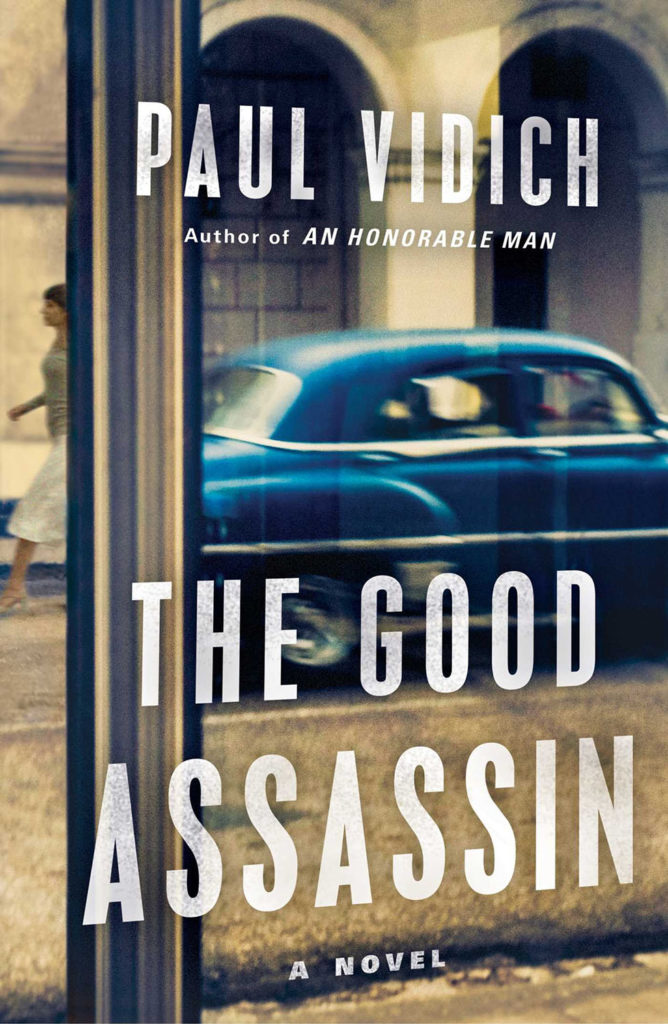The Good Assassin
 Buy the Book: Amazon, Apple Books, Barnes & Noble, Books-A-Million, IndieBound, Google Play, Simon & Schuster
Buy the Book: Amazon, Apple Books, Barnes & Noble, Books-A-Million, IndieBound, Google Play, Simon & SchusterPublished by: Atria/Emily Bestler Books
Release Date: April 18, 2017
Pages: 288
ISBN13: 978-1501110429
Overview
IN THE TURBULENT FINAL DAYS OF CUBA’S BATISTA REGIME, A POSSIBLE TRAITOR WITHIN THE CIA THREATENS TO CHANGE THE OUTCOME OF A REVOLUTION
AUGUST 1958: former CIA agent George Mueller arrives in Cuba’s volatile capital, where he has been assigned to monitor the CIA’s “man in Havana” and possible traitor, none other than his old friend Toby Graham. Under the guise of their brotherly affection, Mueller is recruited to vet rumors that Graham is putting weapons, covertly provided by the CIA to the unpopular Batista regime, in the hands of Castro’s forces. Public exposure of the CIA weapons mission, and the activity of one rogue agent, threaten to embarrass the agency. It is up to Mueller to distinguish whether Graham’s rebel sympathies are true and, if they are, how deep his loyal ties to his old friend lie . . .
Beneath the political turmoil and deadly intrigue lie complicated emotional ties that may blind everyone to the truth. A passionate love affair with an American expat; a world of deceit within the FBI, CIA, and State Department; and dangerous lies and moral bankruptcy from all sides further complicate the already treacherous circumstances in which Mueller finds himself. But both his own code of honor and the outcome of the revolution depend on Mueller’s ability to navigate the corruption and betrayals which permeate his world. Paul Vidich has written a powerful story of the competing ideals, passion, hypocrisy, and destructive rivalries that played out in the months before Castro’s triumphant march into Havana on New Year’s Day 1959.
Praise
“Paul Vidich’s likable and reluctant spy, George Mueller, will keep readers guessing in this eerily real Cuba of 1958. The Good Assassin is a keen historical adventure from the best noir tradition.”
—Elizabeth Kostova, #1 New York Times bestselling author
“Vidich has quickly carved out a place for himself among the very first rank of espionage writers. The Good Assassin is a masterful effort and the author’s best work to date.”
—Michael Harvey, New York Times bestselling author of The Chicago Way
“The Good Assassin is first-rate literary espionage . . . Author Paul Vidich has evoked not only the intrigue and brutality of Batista’s Cuba, but the island itself . . . a masterful work of noir fiction.”
—Susan Isaacs, New York Times bestselling author of A Hint of Strangeness
“Vidich spins a tale of moral and psychological complexity, recalling Graham Greene…a rich, rewarding stew of uncertainty.”
—Booklist
“Cuba in the late 1950’s provides a backdrop for Vidich’s simmering, old-fashioned literary spy tale.”
—Publishers Weekly
Backstory
My wife, a lifelong reader of The New Yorker, finished the May 28, 2012 issue, and passed it along to me with the advice that there was a feature article on an American soldier of fortune that I might want to read. The article set me on a path to write The Good Assassin.
William Morgan was a U.S. citizen who fought in the Cuban Revolution, leading rebels of the Second Front that drove the Cuban army from key positions in the central mountains, helping Fidel Castro’s forces defeat President Fulgencio Batista’s army. Morgan was among two dozen U.S. citizens who fought in the revolution, and one of only three foreign nationals (another was Argentine Che Guevara), to rise to the army’s highest rank, comandante. Morgan’s short, tumultuous life inspired the character Toby Graham, but unlike Morgan, who was executed by a Cuban firing squad after suspicions arose that he worked for the CIA, Graham’s death is neither heroic nor calculated.
Morgan arrived in Cuba in December 1957 when Fidel Castro’s July 26th Movement had established itself as a small but effective opponent to Batista’s corrupt regime. Like many Americans, Morgan was drawn to Cuba after reading New York Times’ reporter Herbert Matthews’s front page account of meeting Castro in the Sierra Maestra Mountains and his romanticized description of the bearded six-foot tall revolutionary who was “an educated, dedicated fanatic, a man of ideals, of courage,” who had “strong ideas of liberty, democracy, and social justice.”
Morgan was a big, flamboyant man, who came of age in the Cold War, and like an earlier generation of young men who volunteered for the Republican cause in the Spanish Civil War, he wanted to make a difference in the world. He found his cause in Cuba’s struggle. Morgan’s role drew interest from the US media and various US government agencies, including the FBI, the State Department, and the CIA. Morgan served under Castro until he was accused of being a CIA spy. After a brief trial he was executed at dawn on March 11, 1961 in La Cabaña, the eighteenth-century stone fortress that overlooks Havana Harbor. He was thirty-two.